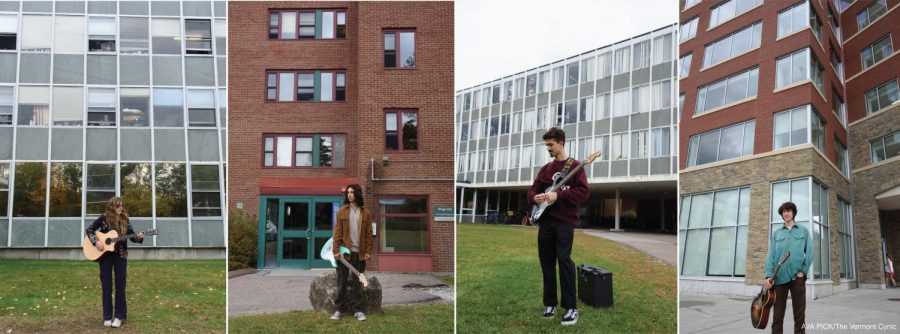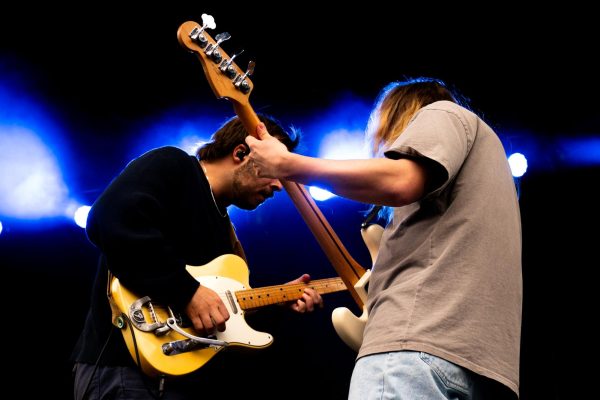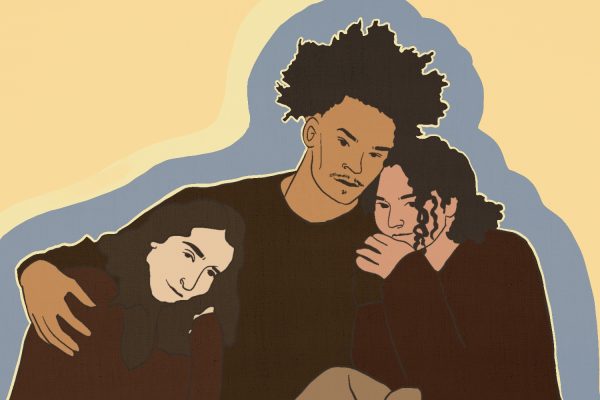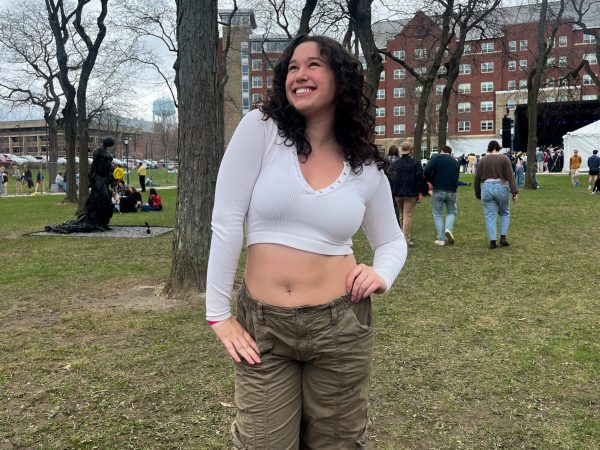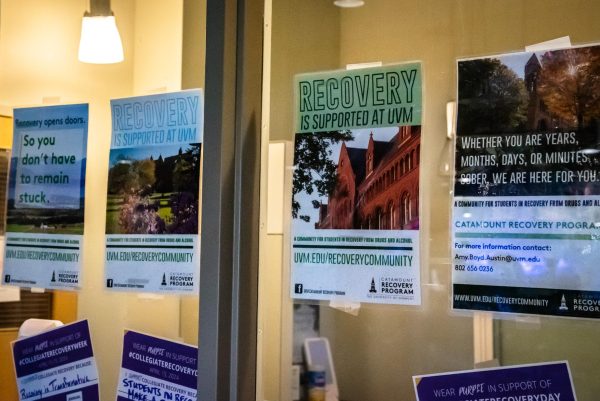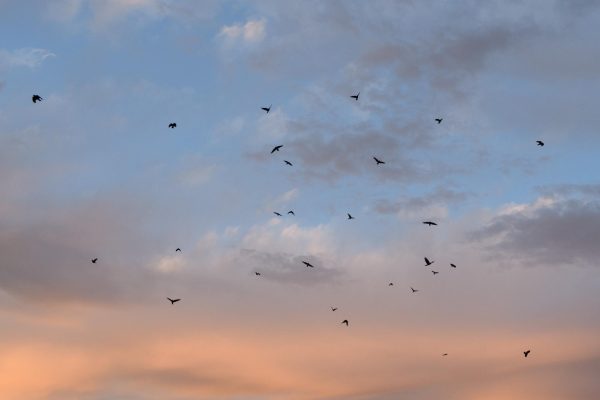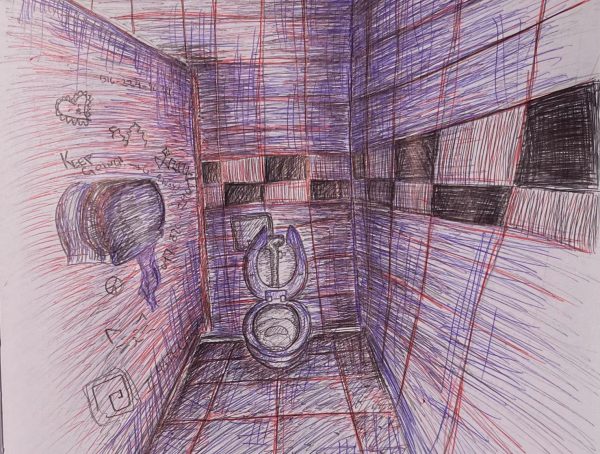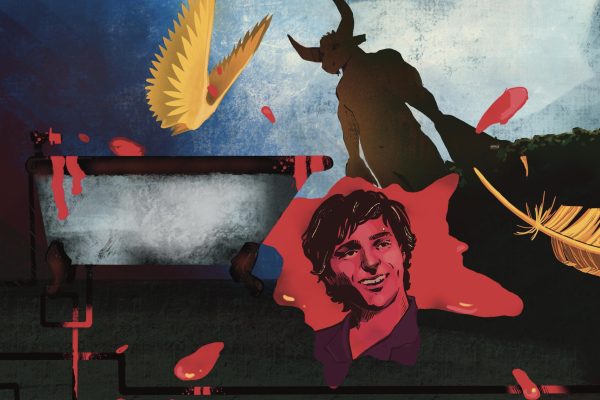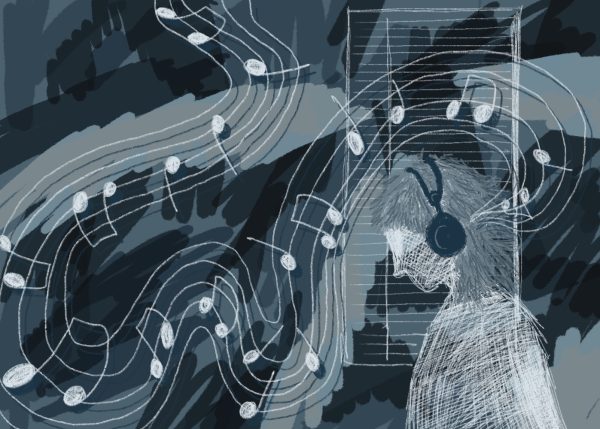The journey to jam: The spatial gap at the heart of UVM’s music community
Photo illustration: Members of student band Cows on the Moon Oct. 13 (left to right): first-years Keagan Lafferty, Peter Nicholson, Sebastian Cataldi and Henry Leister. Two members live on Trinity campus, forcing the other two to bring their equipment from their dorms on Redstone and Central campuses.
Trinity campus is arguably the center of UVM’s on-campus independent music scene and an incredible resource to anyone looking to start a band or to just find people to jam with.
A large number of Burlington’s student bands—such as Lunch, Comatose Kids, Bugbite, Spiders for Breakfast, Scooberdiver and McAuley Kart—found their humble beginnings in the remote corner of campus that is Trinity.
This is a huge credit to the power of Trinity’s Arts and Creativity Learning community.
When I transferred to UVM to study music, I had trouble deciding where to live. Although I knew Trinity was a great community for musicians, I didn’t want to be a long walk from the majority of my classes in Southwick Hall on Redstone, at the opposite edge of UVM’s overarching campus.
I knew those dark, cold winter mornings would keep me in bed just long enough for me to rationalize skipping class.
I’m glad I ended up in the Living/Learning Center. However, at the start of the semester I felt very removed from the music community despite being in several music classes.
It felt as though in order to be a part of the music community at UVM, you had to be in a band or live on Trinity.
Sophomore Sandy Yale, bassist and lead singer for the band Bugbite, said living on Trinity provided a definite advantage when forming the band and helped propel them into the UVM music community.
“That’s where we came together, that’s where we played our first show,” Yale said. “From there, we made connections with other bands and played shows with them. It’s like that community was what brought us together.”
While most bands come out of Trinity, a few bands have emerged from other parts of campus too. Junior Gabe Bango formed his band, Armanodillo, in L/L March of this year.
“We just started playing in our suite, and invited our friends because only, like, 15 people could fit in there, but yeah. It was really fun,” Bango said. “But we still pretty much had like no foot in the door with the band community.”
Bango and his band felt isolated seeing bands, like McAuley Kart, play big shows in the McAuley Great Room on Trinity campus.
“We were just trying to figure out how we could do something like that,” Bango said. “I didn’t personally know any of the people in the music community over there so I just had like, no idea how to get into that.”.
No student organizations provide intentional spaces for these stratified musicians to come together or network. Those not living on Trinity therefore often feel isolated and unsure of how to get involved with a community they so eagerly want to be involved in.
There is also an issue of physical space. As more musicians live on Trinity, most of the best spaces for musicians to gather, practice and play are also predominantly on Trinity: the Great Room, the Back Five and the new Mercy Hall practice space.
The places Redstone campus-, Athletic campus- and Central campus-based musicians could practice or play in are simply too small. Dorm rooms can only fit a handful of friends and Southwick’s practice rooms have just enough room for a piano, a few people and maybe a guitar.
Also, no rooms in Southwick have permanently-placed drum kits, keyboards or sound equipment, and the rooms are not accessible to non-music-majors, unlike the Mercy practice room. Any stationary equipment is a huge commodity to bands, so they will choose convenience over proximity nearly every time.
This leaves bands who form from different parts of campus, like Cows on the Moon, whose members are from Redstone, Trinity and Central, still having to schlep their equipment to Trinity for practice.
There are definitely bigger spaces in dorms throughout campus that should be used for music—and oftentimes are—but because they are not music-designated spaces, bands get in trouble for making excessive noise in them.
At the end of the day, musicians will do what they do best: get creative. I’ve seen flyers for people looking to jam, heard people playing in common rooms and happened upon the occasional meeting of the Folk Music Club in the amphitheater.
However, musicians should be better supported across campus, without having to go to such extremes just to jam in subpar conditions.
We should be making it easier for people who don’t want to break any rules or don’t automatically have access to a network of musicians built into their major or living environment.
Where are the resources for those folks to network with other student musicians?
I recently saw an announcement on Instagram about the newly recognized student record label, Real Love Records, run by Bango and friends.
To say I am excited about this is an understatement.
“[Real Love Records] is a space for UVM students to come together and explore musical interests through project collaboration in all aspects of the business whether it be production, management, artistic design or just finding an opportunity to jam with other musicians,” according to a Sept. 23 Instagram post.
The club has big goals, from hosting open mic events to masterclasses with music industry professionals, Bango said.
Although the club is relatively small and still planning how their group will run with more members, it will bring much-needed ties to UVM’s music community and distribute more resources to a bunch of talented people that definitely deserve it.
Within this community to gather, network and create, I hope we can come together to address the need for more physical spaces for music across campus too.


